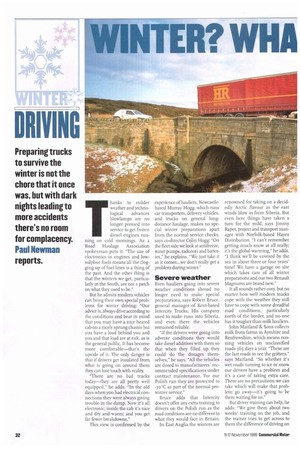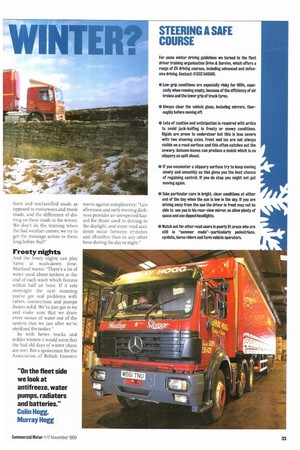REITER? WHA
Page 34

Page 35

If you've noticed an error in this article please click here to report it so we can fix it.
DRIVING
Preparing trucks to survive the winter is not the chore that it once was, but with dark nights leading to more accidents there's no room for complacency. Paul Newman reports.
Thanks to milder weather and techno
logical advances blowlamps are no longer pressed into service to get frozen diesel engines running on cold mornings. As a Road Haulage Association spokesman puts it: The use of electronics in engines and lowsulphur fuels means all the clogging up of fuel lines is a thing of the past. And the other thing is that the winters we get, particularly in the South, are not a patch on what they used to be."
But he admits modem vehicles can bring their own special problems for winter driving: "Our advice is, always drive according to the conditions and bear in mind that you may have a nice heated cab on a nicely sprung chassis but you have a load behind you and you and that load are at risk, as is the general public. It has become more comfortable—that's the upside of it. The only danger is that if drivers get insulated from what is going on around them they can lose touch with reality.
"There are no bad trucks today—they are all pretty well equipped," he adds. "In the old days when you had electrical connections they were always giving trouble in the damp. Now it's all electronic; inside the cab its nice and dry and warm; and you get far fewer breakdowns."
This view is confirmed by the experience of hauliers. Newcastlebased Murray Hogg, which runs car transporters, delivery vehicles, and trucks on general longdistance haulage, makes no special winter preparations apart from the normal service checks, says co-director Cohn Hogg: "On the fleet side we look at antifreeze, water pumps, radiators and batteries," he explains. "We just take it as it comes...we don't really get a problem during winter."
Severe weather
Even hauliers going into severe weather conditions abroad no longer need to make special preparations, says Robert Bruce, general manager of Kent-based Intercity Trucks. His company used to make runs into Siberia, and even there the vehicles remained reliable.
"If the drivers were going into adverse conditions they would take diesel additives with them so that when they filled up they could do the dosages themselves," he says. "All the vehicles are dosed to manufacturers' recommended specifications under contract maintenance. For our Polish run they are protected to -3o°C as part of the normal prewinter service."
Bruce adds that Intercity doesn't offer any extra training to drivers on the Polish run as the road conditions are no different to what they would face in Britain.
In East Anglia the winters are
renowned for taking on a decidedly Arctic flavour as the east winds blow in from Siberia. But even here things have taken a turn for the mild, says Jimmy Raper, project and transport manager with Norfolk-based Hayes Distribution. "I can't remember getting much snow at all really; it's the global warming," he adds. "I think we'll be covered by the sea in about three or four years' time! We have a garage on site which takes care of all winter preparations and our two Renault Magnums are brand new."
It all sounds rather cosy, but no matter how well modern trucks cope with the weather they still have to cope with some dreadful road conditions, particularly north of the border, and no one has it tougher than milk hauliers.
John Maitland 8i, Sons collects milk from farms in Ayrshire and Renfrewshire, which means running vehicles on unclassified roads 365 days a year. "These are the last roads to see the gritters," says Maitland. "So whether it's wet roads turning to ice or snow our drivers have a problem and it's a case of taking extra care. There are no precautions we can take which will make that problem go away—it's going to be there waiting for us."
But driver training can help, he adds: "We give them about two weeks' training on the job, and the trainer tries to get across to them the difference of driving on
farm and unclassified roads as opposed to motorways and trunk roads, and the difference of driving on these roads in the winter. We don't do the training when the bad weather comes; we try to get the message across to them long before that!"
Frosty nights
And the frosty nights can play havoc at wash-down time, Maitland warns: "There's a lot of water used about tankers at the end of each wash which freezes within half an hour. If it sets overnight the next morning you've got real problems with valves, connections and pumps frozen solid. We've just got to try and make sure that we drain every ounce of water out of the system that we can after we've sterilised the tanker.
So with better trucks and milder winters it would seem that the bad old days of winter chaos are over. But a spokesman for the Association of British Insurers
warns against complacency: "Late afternoon and early evening darkness provides an unexpected hazard for those used to driving in the daylight, and more road accidents occur between 17:oohrs and 18:oohrs than in any other hour during the day or night."
STEERING A SAFE COURSE
For some winter driving guidelines we turned to the fleet driver training organisation Drive & Survive, which offers a range of CV driving courses, including advanced and defensive driving. Contact: 01332 546500.
• Low-grip conditions are especially risky for HU& especially when running empty, because of the efficiency of air brakes and the lower grip of truck tyres.
• Always clear the vehicle glass. including mirrors, thoroughly before moving off.
• Lots of caution and anticipation is required with artics to avoid jack-knifing in frosty or snowy conditions. Rigids are prone to understeer but this is less severe with two steering axles. Frost and ice are not always visible on a road surface and this often catches out the unwary. Autumn leaves can produce a mulch which is as slippery as spilt diesel.
• If you encounter a slippery surface try to keep moving slowly and smoothly as this gives you the best chance of regaining control. If you do stop you might not get moving again.
• Take particular care in bright, clear conditions at either end of the day when the sun is low in the sky. If you are driving away from the sun the driver in front may not be able to see you in his rear-view mirror. so allow plenty of space and use dipped headlights.
• Watch out for other road users in poorly lit areas who are still in -summer mode—particularly pedestrians, cyclists, horse riders and farm vehicle operators.












































































































